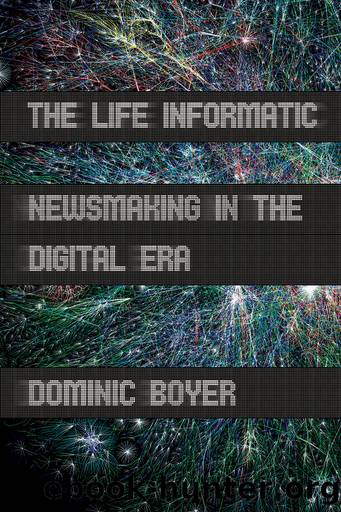The Life Informatic by Dominic Boyer

Author:Dominic Boyer [Boyer, Dominic]
Language: eng
Format: epub
Tags: Social Science, Media Studies, Language Arts & Disciplines, Journalism
ISBN: 9780801467356
Google: 6f2tDwAAQBAJ
Publisher: Cornell University Press
Published: 2013-04-26T03:29:44+00:00
Publicity without Feedback
Journalists were also aware that their ability to simulate their audience and its Ãffentlichkeit had its limits. It was difficult to forget, for example, that although their audience was growing in size, it was also narrowing demographically. The average age of mdr info listeners had just passed fifty in 2009. It was particularly straining for the Redaktion to imagine and model the voices and interests of a younger audience who seemed simply to be disengaging from broadcast publicity in favor of the lateral connectivities of the Internet and social media. Since the RStV drastically inhibited MDR from developing new online initiatives for its listeners, there seemed to be little that could be done to combat the narrowing of mdr infoâs radius of publicity. As practiced as the Redakteure were in performing Ãffentlichkeit in microcosm, these performances were unsettled by the recognition that publicity in the digital era seemed overlaid with the expectation of some form of fast-time bidirectional exchange that mdr info was not, at least under current conditions, capable of providing.
I wondered whether journalists rued that they could not participate more actively in lateral communication with their audience and often found that they did, slightly. There was genuine and general disappointment in the Redaktion with the restrictions imposed on their online activity. Yet, I also found that many journalists associated online activity with an undermining of their professional authority, a professional authority they understood as essential for the operation of any positive Ãffentlichkeit. Marc talked through the ambivalence of what he termed Zweiwegkommunikation (two-way communication) in a later interview:
âLike everything else in the world there are two sides to this. On the one hand, Iâd love to know what people are really interested in. We have a certain Handwerkszeug [craft tool], news criteria, and we think thatâs [shrugs] OK. But it doesnât quite add up. I can take my news criteria and write six news bulletins but whether those will actually have the effect I imagine, I have no idea. I could imagine perhaps a tool that people could use to click on in real-time about whether they are interested in something or not. And I wonder how many of our Themen would then simply disappear because people may not be interested in them although they are things that people ought to know. That is what I find dangerous about this two-way communication. Itâs true, we know far too little about our listeners; itâs a common complaint, and thereâs ever more research and the findings are usually that people want news, weather, trafficâwhich is basically what we already know [laughs]. . . . There was this amusing study where they read a focus group the news and gave them all little buttons to push when they heard something they were interested in. This was right here in Saxony-Anhalt. So, first topic: âIn Saxony-Anhalt, the government decided . . .â Good, buttons pressed, everyone was interested. Second topic: âChancellor Schröder . . .â And immediately all fingers [came] off the buttons [laughs] and they didnât click again for a while.
Download
This site does not store any files on its server. We only index and link to content provided by other sites. Please contact the content providers to delete copyright contents if any and email us, we'll remove relevant links or contents immediately.
| Publishing & Books | Research |
| Writing |
Asking the Right Questions: A Guide to Critical Thinking by M. Neil Browne & Stuart M. Keeley(5765)
Autoboyography by Christina Lauren(5228)
Eat That Frog! by Brian Tracy(4527)
Dialogue by Robert McKee(4390)
Sticky Fingers by Joe Hagan(4190)
Journeys Out of the Body by Robert Monroe(3621)
Annapurna by Maurice Herzog(3464)
Full Circle by Michael Palin(3443)
Schaum's Quick Guide to Writing Great Short Stories by Margaret Lucke(3376)
Elements of Style 2017 by Richard De A'Morelli(3343)
The Art of Dramatic Writing: Its Basis in the Creative Interpretation of Human Motives by Egri Lajos(3063)
Atlas Obscura by Joshua Foer(2955)
Why I Write by George Orwell(2945)
The Fight by Norman Mailer(2930)
The Diviners by Libba Bray(2928)
In Patagonia by Bruce Chatwin(2922)
The Mental Game of Writing: How to Overcome Obstacles, Stay Creative and Productive, and Free Your Mind for Success by James Scott Bell(2904)
Venice by Jan Morris(2570)
The Elements of Style by William Strunk and E. B. White(2470)
